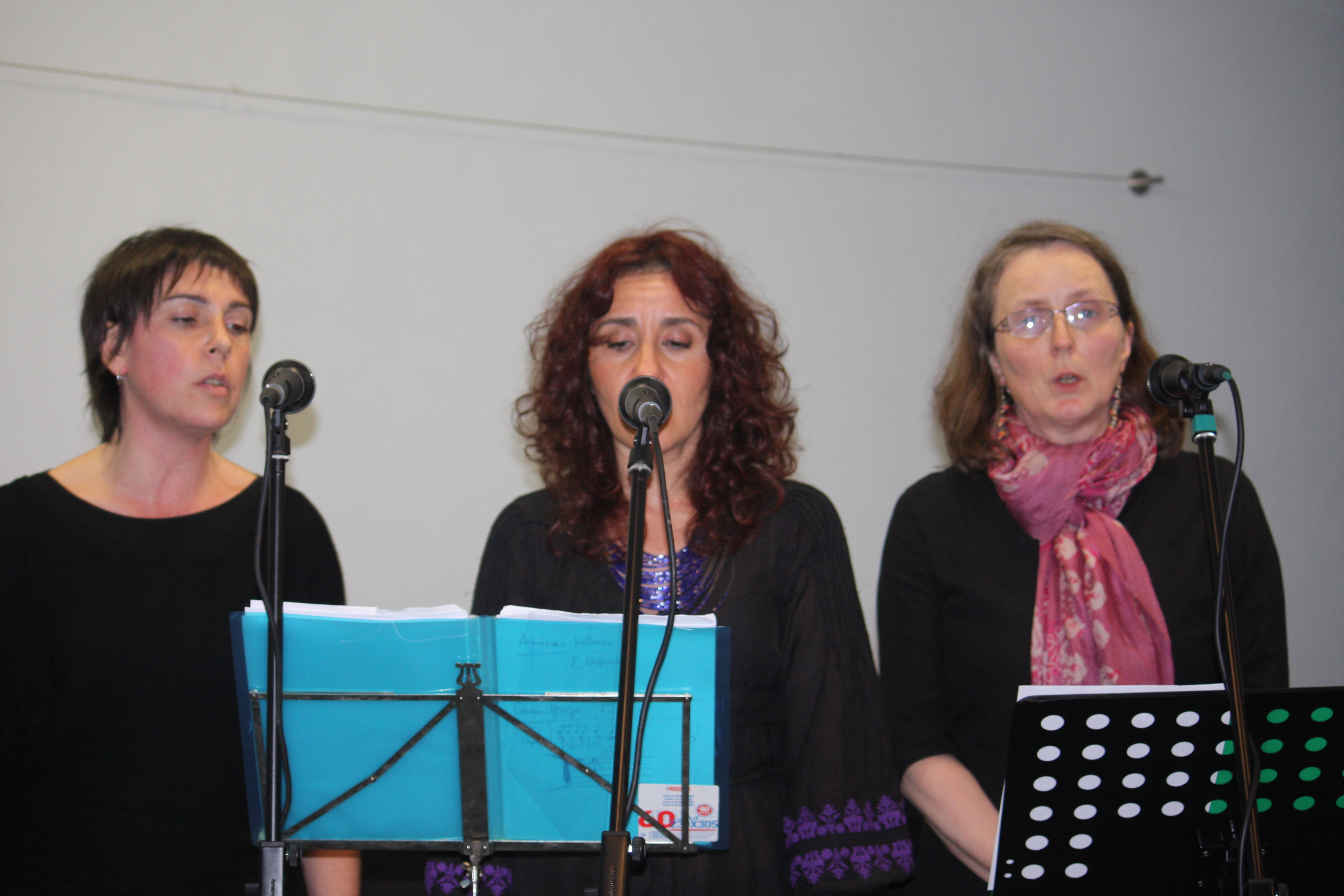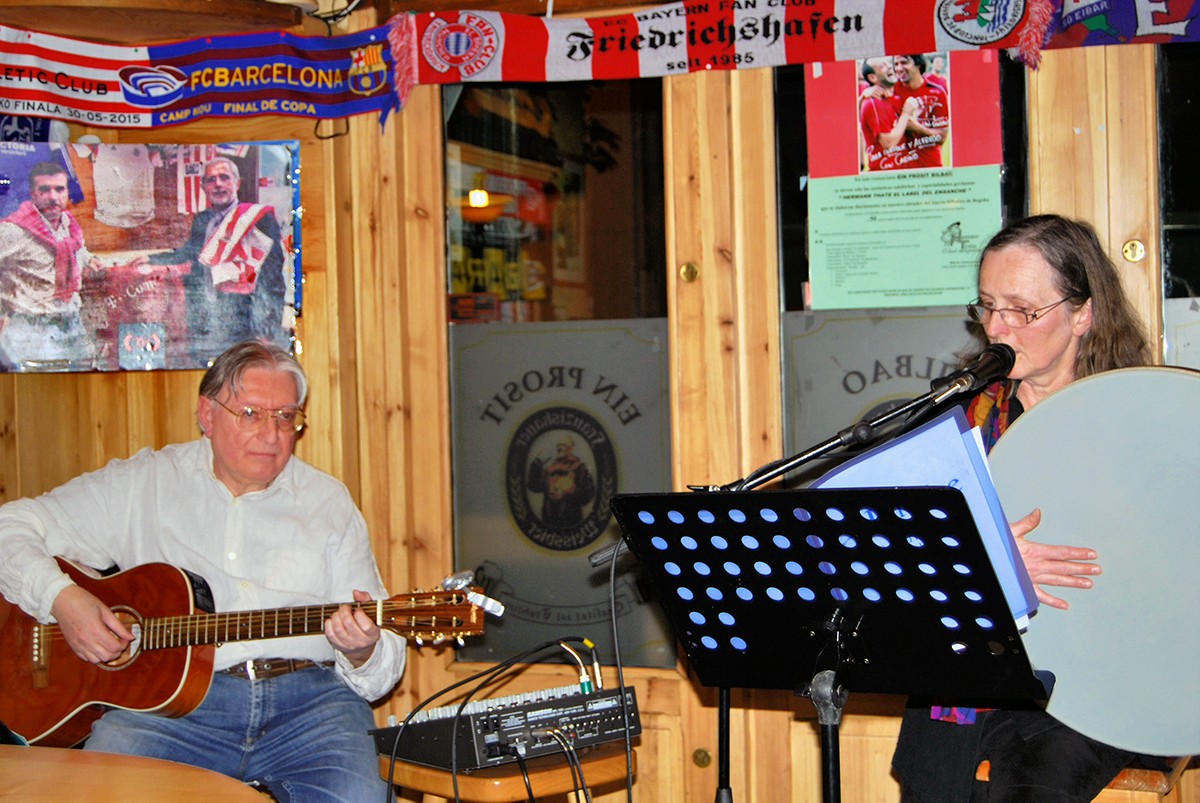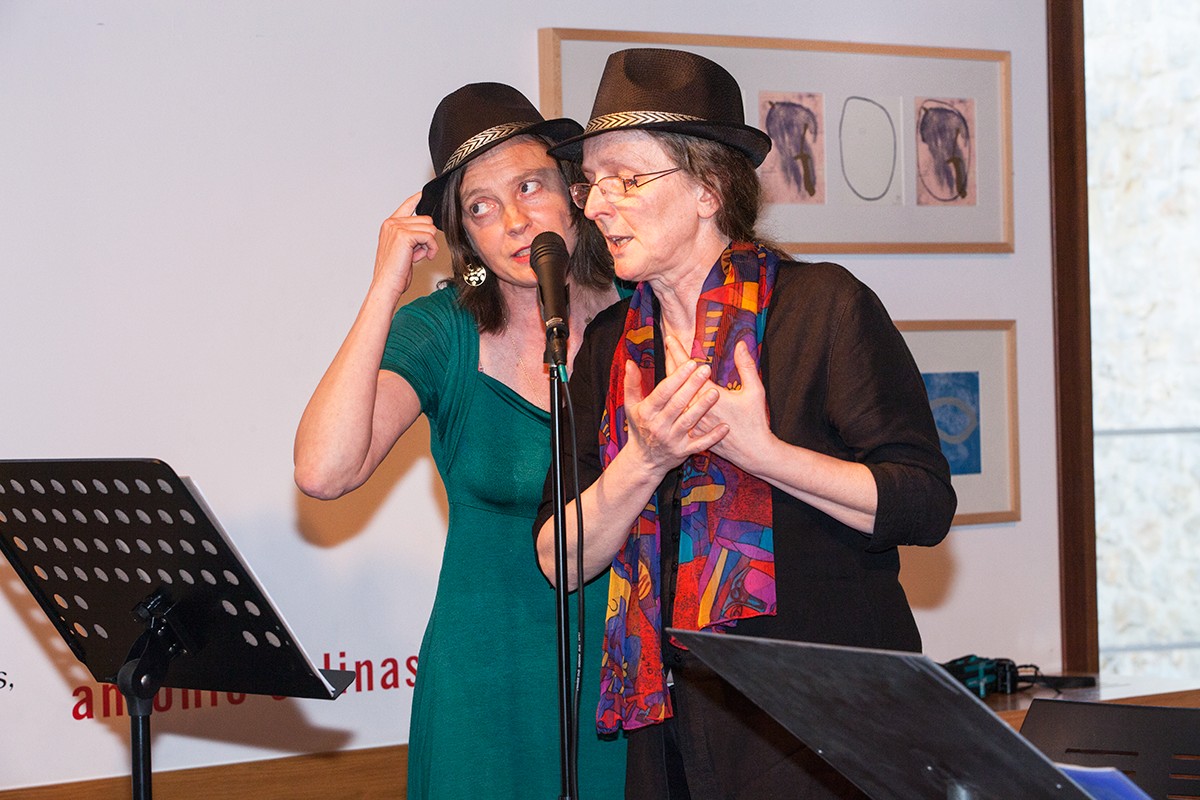The following downloadable texts contain the essential information on the artistc proposals of Lilofee. It corresponds more or less to the EPK (electronic press kit).
Here the English text is shown on screen (downloadable at the bottom of this text).
Index
- Information about Lilofee 4
- Biography 5
- Types of actions 6
- Musical projects and concerts 7
- Songs and ballads of Germanic cultures (as a soloist) 7
- Love, vice and death. A journey through German songs and poems 8
- Opinions of cultural leaders, the public and other artists 11
Information about Lilofee
First name – Lilofee
Musical / artistic style – Songs and ballads of Germanic cultures, German poetry
Creation – August 2014
Landline – (+34) 946 682 284
Mobile phone – (+34) 610 863 369
Email – mail to: lilofee@fn.de • ruebezahl-productions@kuschick.eu
Official Web site – https://lilofee.kuschick.eu/
Audio on the official site – https://lilofee.kuschick.eu/multimedia/audio/
Facebook – https://www.facebook.com/lilofee.ballad
ReverbNation – https://www.reverbnation.com/lilofee8
SoundCloud – https://soundcloud.com/user-342684378
Producer: – Rübezahl Productions
Website: https://ruebezahl-productions.kuschick.eu/
Facebook: https://www.facebook.com/ruebezahlprod/
Biography
Lilofee was born in 1962 in Münster, Westphalia (Germany). She grew up in a family linked to music. Among the songs that were performed were Christmas carols from the Advent season sung or played with instruments. At that time her older brother often lent her his Framus western acoustic guitar and a diatonic accordion. From the late 70’s to the early 80’s, she played the guitar and sang in a local group of young folk-rock music, until she started college to study the Anthropology career.
Between 1989 and 1990 she traveled to Spain to undertake her field research in cultural anthropology in Extremadura. In these circumstances she returns to music, interviewing and recording popular musicians. Later she settled permanently in Spain (Madrid) to live and work as a freelance anthropologist in this country, firstly between Extremadura and Madrid. In 1997 she moved to Bizkaia (Vizcaya). There, in 2001 and in the framework of a commissioned study in the Mining Zone of the Left Bank, she finds popular singers that she has to interview. In 2004, she met the French ethnomusicologist Raphaël Parejo-Coudert in this same research framework. Since then, they have been working together on various research and dissemination projects, especially the musical heritage (using professional quality audio and video recordings). They create the European association Txoke! (2007) which is dedicated to research and dissemination of cultural heritage. In 2010 they organize an international congress on intangible cultural heritage in Bilbao in which music is also present.
As of 2013, Lilofee takes up music with the intention of giving professional concerts. She is co-founder of an informal platform “Möbius Sounds Project” in which vocal and instrumental experiences are carried out, fusing musical styles and traditions from various cultures. This experience allows her to make contact with new musical cultures and genres. First performances take place in Getxo in the neighborhoods of Algorta and Las Arenas (Bizkaia, Basque Autonomous Community), then in a singer bar in the same city and in the town of Sopelana .

In 2014 Lilofee gives three concerts in the framework of the German “Oktoberfest” (beer festival), two in Bilbao and one in the Biscayan village of Areatza, accompanied by Raphaël Parejo (multi-instrumentalist musician). With him she founded at the same time the duo “Sweet Winds” that presents a repertoire of international songs and ballads. In March 2017 Sweet Winds sings the night of the “Saint Patrick” in Berango.

She founded with Raphaël Parejo and two other musicians the musicians association “Musixpand” in which Lilofee is a secretary. Through the association, formations and dissemination events are organized. She becomes a musical agent to promote musicians from all over Europe.
After these first experiences the idea of creating an original repertoire of songs and ballads of the Germanic cultures was born. For four years, taking advantage of her knowledge as a researcher in anthropology, she investigates the subject with the help of Raphaël Parejo-Coudert. The two rehearse, Raphaël arranges and harmonizes the selected themes, most of them very few known even in Germany. During 2016 and 2017, the programs in Lilofee solo as a singer and instrumentalist (guitar, frame drum and other instruments) are outlined, and only in November 2017, part of the repertoire at the Ein Prosit Bilbao German restaurant opens under the title ” Songs and ballads of the Germanic cultures “. On June 2, 2018, she premiered her recital of German songs and poems “Love, vice, death” with Anke Schulz (declamation of poems) at the Urueña e-LEA center (Villa del Libro, Valladolid, Castilla y León, Spain) and Raphaël Parejo (musical arrangements and accompaniment on guitars), a show that gets a resounding success.

Performances
Lilofee acts mainly in concert halls and theaters, but also in libraries and cultural centers, in quality theaters and even private concerts on special order. Besides, she participates in events that unite music to poetry, such as meetings, cultural gatherings, poetic nights, and so on.
She also offers a program with cabaret classics.
Musical projects and concerts
Lilofee’s repertoire is based on a solid background of self-serving research that makes its originality and strength. The geographical areas considered reveal the important influence of the Germanic languages in Europe, and include Germany, Austria, Switzerland, but also other European countries of Germanic speech (Belgium, Holland, and Scandinavian countries). On the other hand, the time period addressed is broad and goes from the Middle Ages to our XXI century with selected songs by some singer-songwriters and original compositions demonstrating a certain thematic unity over the centuries.
This own global musical project is embodied in two main programs:
• “Songs and ballads of Germanic cultures”
• “Love, vice and death. Travel through German songs and poetry. ”
Songs and ballads of Germanic cultures (as a soloist)
This program presents the global musical project in German language (as one of several Germanic languages) Lilofee plays emblematic songs and ballads from the Middle Ages, from known and unknown authors to works of contemporary songwriters and composers of very different styles, with strong expressiveness to through instruments and his voice from a special bell. Also included in this repertoire are songs known as “classics” from the 17th to the 19th century, with surprising content. Beings of mythology and the fantastic kingdom become protagonists. Lilofee interprets them in standardized German but also in different dialects such as Platt (spoken in northern Germany) and Southern Oberdeutsch (such as Bavarian, Austrian etc.) plus some of the Scandinavian languages which are also rooted Germanic
Listen to the stories of knights, troubadours, trolls, mountain spirits, drunks, pirates, assassins, sirens, princesses, lovers, kings, brides, rebels, prophets, soldiers, prisoners, prostitutes, neighbors, sailors, street musicians, Orphans and death in person! Life and its exalting moments but also all its miseries. Ballades speak of all this.
Love, vice and death. A journey through German songs and poems
“An absolutely extraordinary concert-recital both for the theme and the selection of the repertoire and for the brilliance of the interpretation”.
Pedro Mencía Herreras (director of the e-LEA cultural center in Urueña, Valladolid, Castilla y León, Spain).
This new program presents a careful selection of songs and poems spanning several centuries. The majority are from identified authors. The recital shows the continuity of the great tradition transmitted by the German language and its dialects. They are mostly sung or recited ballads, although forms and styles have changed over the centuries. Some remain known and have been perpetuated without hiatus while others have been rescued from oblivion by researchers. A particular case is that of the songs that have been “killed” as the singer-songwriter Franz Josef Degenhardt says. Among them are folk songs or known authors, recovered and manipulated by the Nazi regime, which made after the Second World War few singers have dared to interpret, either by rejection of Nazi ideology or fear of being associated with the Nazism.
The recital proposed by Lilofee is making a bridge between the roots that lie in medieval works, going through several centuries until the twentieth and twenty-first century. They alternate poetic works recited by a narrator and songs performed by the singer. The works cover recurrent and central themes of German literary and lyrical creation that deal with love, morals and existence, all taken in all their facets.
A particularity of Germany is the case of the “lieder” or poems placed in music. From the eighteenth century and until the twentieth century many composers put new melodies to known texts and even other music to “lieder” earlier. The best-known “lieders” are based on the poems of Goethe and Heine and were put into music by composers such as Schubert, Schumann, Karl Loewe, Friedrich Silcher and other musicians of the Romantic era. As for the 20th century, the importance of Brecht’s joint work with several composers, among which Kurt Weill and Hanns Eisler, served by exceptional interpreters such as Lotte Lenya, Ernst Busch and others. His works are still interpreted today.

More recently, in the decades of the 60s and 70s of the past century famous singer-songwriters took up the baton of the old troubadours and poets, such as the aforementioned Franz Josef Degenhardt (Germany), Georg Danzer (Austria), and so on.
On stage, the singer brings her sensitivity and talent as an interpreter, her amazing voice with a very particular timbre that knows how to transmit all the facets and emotions of the songs, elements that make her concert-recital a very original show. The work of the narrator (or narrator) who recites the poems in their original language, as well as the musical work of Raphaël Parejo that accompanies Lilofee and has signed the vast majority of the arrangements, contribute to make this concert-recital a unique experience.
Opinions of the public and other artists
“A short time ago I had the opportunity to attend a Lilofee concert. The songs that make up the repertoire -basically ballads, a genre that’s always in force and never superfluous- span hundreds of years and generations even though their problems and their hopes are summed up in many less concepts: life, death and everything what between one and the other “humanizes” us and makes us dream. The shadow of Bertold Brecht – one of the most present authors in the concert – plans on the spectator forcing us to look differently towards a scenario that is full of words, narrations, thanks to the magical sound of the right voice and its fair accompaniment”. Joaquín Díaz (folklorist, professor and singer, Joaquín Díaz Foundation).
“An absolutely extraordinary concert-recital both for the theme and the selection of the repertoire as for the brilliance of the interpretation “. Pedro Mencía Herreras (director of the e-LEA cultural center in Urueña, Valladolid, Castilla y León, Spain) with regard to the concert-recital “Love, vice, death”.”
“Lilofee (voice, percussion and guitar) and Raphaël Parejo (guitar and arrangements) give us the essence of German poetry and popular song, which belongs to the collection of the heritage of that culture. But, far from recreating endulcoured romantic feelings, present us with a selection of poetic texts with a critical touch and a strong flavor to Heine, Brecht and Weill. The boldest of the Middle Ages dialogue with the erotic ‘rosita del brezal’ by Goethe and there is no lack of commitment eitherwith the freedom of thought. Anke Schulz, with his discreet but expressive language body and his clear voice recites, between ballad and ballad, beautiful poems in a soothing tone that seduces “(Sabine Geck, University of Valladolid, Department of German Philology)?
“Piece of show … poetic, beautiful, deep, close … Three Artists with capital letters, wasting ingenuity! […] Wonderful, deep, beautiful and loving performance on Saturday in Urueña … As expected, it was all a poetic pleasure to feel you (Rosa Olabarrieta, Bilbao, Vizcaya, Spain).
“Congratulations for the success!” (Sabine Dünkel, German teacher in Vizcaya, Spain).“Thank you for your poetry and music, and I appreciate the perseverance to be there in scene […] I admire the vital force of you. I know what that means. Self-management is beautiful with its costs obviously, poetry has the search for new ways and scenarios, because if they do not exist they are manufactured. It seems that obstinacy in the end has some magic. I wish you continue with this obstinacy and the courage to sustain that in what do you believ, a hug for you. Congratulations. Martha López Guzmán (Chile).
“Congratulations my friends for the success”. María Jesús López Lorenzo (National Library of Spain).
“Congratulations for this beautiful achievement [concert-recital in Urueña, Valladolid, Spain] … I also wish you a good continuation!” (Anaïg Salaün, Brittany, France)
“Bravo Lilofee and Raphaël, it’s a pleasure to see you on stage, happy! […] I wish you a good continuation and many successes. Ahead !” (Pierre-Olivier Combelles, France).
“Very beautiful lied sung by Lilofee [Erinnerung An Die Marie A.]. I really like the melody, voice, accompaniment, and the sound is really excellent; I have the feeling of being at his side. Lilofee sings with eagerness, joviality but also nostalgia. The melody stayed engraved in my head. I really like this: joviality and nostalgia. I need to always be an aficionado of the ‘lieder’, especiallyof Schubert (sung by Dietrich Fischer-Dieskau), but also of Schumann, etc. (Pierre-Olivier Combelles, France).
“I like it a lot [the lied Erinnerung An Die Marie A.]. The voice is very sweet and pleasant hear”. Malory Bauchet Marques (France).
“Lilofee’s voice is fantastic! A great professional. ” Gentzane Santamaría (Bilbao, Vizcaya, Spain).
“I liked it a lot, she sings with a lot of personality, it’s extremely personal style. Despite not understanding the language, I was able to capture the feeling. ” Marcos Chávez (singer-songwriter, Argentina)
“Lilofee sang very beautiful, and Raphaël a phenomenon on guitar. What a pair of phenomena “! Juan José Abad Robador (multistrumentist musician, Vizcaya, Spain).
Press information on Lilofee, German Songs and Poems, PDF (de) (es) (fr) (en)
